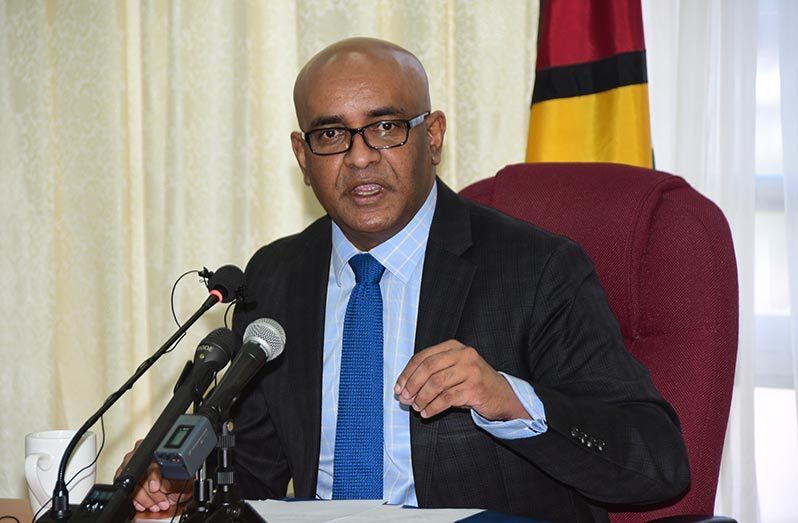–Vice-President Jagdeo says
WHEN the National Assembly reconvenes next week, the government will be moving to table two critical pieces of legislation: the Local Content legislation and amendments to the Natural Resources Fund (NRF) Act.
This confirmation was given on Thursday night by Vice-President Dr. Bharrat Jagdeo, who highlighted that, as part of the proposed amendments to the NRF, a Finance Minister could face up to 10 years’ imprisonment for failing to disclose and officially Gazette receipt of oil revenues within a three-month period.
Jagdeo told attendees of the 132nd Awards Ceremony hosted by the Georgetown Chamber of Commerce and Industry (GCCI), that the government will not touch a dime of the $US534 million contained in the fund, unless the existing legislation is amended to ensure greater transparency with regards to use of the monies.
He went further to reference previous transgressions committed by the former A Partnership for National Unity + Alliance for Change (APNU+AFC), particularly as it related to a signing bonus it received from oil giant, ExxonMobil in 2016.
“The former finance minister said we never received nor did we request a signing bonus…a year after they [the previous government] had received the $18 million U.S. dollars and placed it in an account that is not reflected in the consolidated fund nor was part of the balance sheet of the central bank,” Jagdeo recalled.
He reminded too that the People’s Progressive Party/Civic was forced to go as far as the courts to ensure that the monies were paid into the Consolidated Fund, in accordance with the constitution.
Altogether, Jagdeo said that four major sets of amendments were being proposed for the legislation which governs the NRF.
The first order of business, the Vice-President related, has to do with rectifying the fund’s oversight committee which comprises of 22 persons representing 22 organisations.
“…It is almost impossible to get anything done with 22 different organisations having oversight responsibility; that has to change,” Jagdeo posited.
He said, too, that the amendments propose that a Board of Directors be strategically inserted to function between the Finance Minister and the management of the fund.
“While in opposition, we said that the Minister of Finance was too directly involved and had too much of an influence in the legislation,” the Vice-President noted.
He went further to highlight the complexity of the existing legislation, and need for transparency going forward.
He said that as it is now, a macroeconomic committee which reports to the minister is responsible for calculating an economically sustainable sum of money that could be withdrawn from the NRF.
“[However] there is no transparency on how this sum would be calculated, but the Minister appoints the macroeconomic committee, so he controls the macroeconomic committee and the minister, on his own, determines the fiscally sustainable amount he could withdraw,” Jagdeo highlighted.
He said that with the amendments, all matters pertaining to the NRF, including deposits and withdrawals, would be clearly publicised and could be easily understood by members of the public.
“We are replacing all of that with a clear formula…it is not going to be complex. It will say that below this sum on an annual basis, the money comes directly to the treasury, and beyond this sum, larger shares of it will be saved,” the Vice-President told the private sector members.
He lamented the fact that the NRF legislation in its current form is cumbersome, and written in a manner that is “like an academic paper and almost impossible to operationalise.”
HEAVILY CRITICISED
Apart from members of the PPP/C government, the formulation of the NRF legislation was heavily criticised by reputable international agencies, including the Inter-American Development Bank (IDB), which highlighted that the objectives and design of Guyana’s NRF raise several issues.
“The fund on its own cannot achieve the objectives that have been set for it. The rigid withdrawal rules may do little to foster stabilisation or saving but may entail fiscal costs,” the IDB said in a report titled “Economic Institutions for a Resilient Caribbean.”
It also outlined that the formula for the maximum permissible withdrawal is among the most complex operational rules for a resource fund in the world. “Its design departs from good practices,” the IDB argued.
The publication noted too: “The state-of-the-art advice based on international experience and good fiscal management principles emphasises simplicity, flexibility, transparency, and close integration with the budget and public asset-liability management, and that the rule’s complexity may also conspire against fiscal transparency and public understanding.”
The Finance Ministry, headed by Senior Minister in the Office of the President with responsibility for Finance, Dr. Ashni Singh, had also issued a strongly-worded statement which outlined the fact that the NRF legislation was rushed through the National Assembly “even after the then government lost a No-Confidence Motion (NCM) in December 2018, thereby losing its mandate to govern.”
“In total disregard for the clear consequences that are constitutionally due to flow from a NCM, Jordan’s government rushed, in January 2019, to sneak the NRF Bill through Parliament with no Opposition participation and no Opposition input. Here again, his letter is replete with brazen misrepresentations,” the ministry posited.
The Finance Ministry was also adamant that the “irrefutable fact of the matter is that the NRF Act in its current form was a piece of legislation which was very poorly conceived, and was “rammed down the throats” of the nation.
Nonetheless, Jagdeo said that with the amendments, the government’s aim is to ensure that every Guyanese is able to easily calculate deposits and spending relating to the fund.
Once the amendments are passed, Jagdeo said that government will begin to utilise the oil revenues to bolster critical non-oil sectors including agriculture, education and a myriad of social services.
The former Head of State also emphasised the need for investments in the area of climate change, particularly as it relates to implementing and maintaining a comprehensive energy mix, using hydro, solar and gas as renewable forms of energy.




.jpg)










